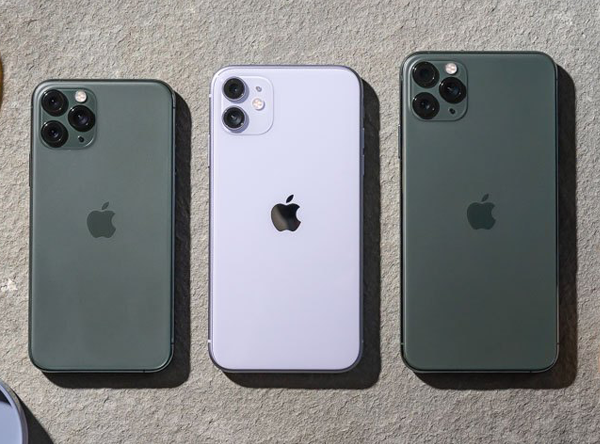The iPhone ratings are in, and iPad surpasses iPhone sales. Apple released its first-generation tablet, the iPad, in early April to lukewarm reviews. Amidst some concerns expressed by media giants, like CNET, conumers still flocked in droves to snag Apple’s breakthrough multimedia device.
Moving over 500,000 units in less than 2 weeks, the iPad even outsold the iPhone – the cornerstone of Apple’s next generation product line – in the same timeframe. The iPad is another testament to Apple’s ability to inspire and excite the consumer electronics market in an impressive fashion by perfectly employing the silent drum marketing tactic. This will influence the BYOD trend.
iPhone Ratings: Consumer Satisfaction Study, Developers Migrating Over
While the frenzy surrounding the iPad has been making the media rounds, it is the iPhone that continues to be Apple’s hallmark of innovation, by racking-up top grades in a string of recent surveys. The latest study by Ovum, a leading research institute that provides qualitative analysis on the technology sector, has reaffirmed iPhone’s status as the benchmark in the mobile development world. The scientific study found that out of 217 renowned developers surveyed, 81% of them were currently using or planning to develop on iPhone’s smartphone platform.
Noted for their developer-friendly environment and enhanced graphical user interface, the iPhone has been a standout choice for mobile developers. Furthermore, Apple’s ability to help instantly monetize their software products – by creating the Apple App Store that links suppliers with consumers – has resulted in more developers committed to working on iPhone’s platform.
Adding to iPhone’s status as a leader and trend-setter in the smartphone sector is the latest study coming out of JD Power, a consumer-serving pioneer who informs the buying decisions of customers with key customer satisfaction data. JD Power’s recent study found that iPhone’s high customer satisfaction rates (810 points) remain unchanged since last October. In the face of a major marketing push by Android-based handhelds, like HTC (727) and Nokia (720), the iPhone still scored the highest grades in the three areas that mattered most to consumers: touchscreen capabilities, GPS systems, and ease of use. The iPhone also leapfrogged ahead of its main competitor, BlackBerry, who registered a 741 on JD Power’s innovative scoring methodology.
Apple and its Discontents
But all the news coming out of the Apple universe in recent weeks hasn’t been all great. While being praised for increasing the earning power of developers by opening up doors to the mass market, more and more developers are continuing to lash out at Apple. Citing their restrictive framework, developers feel handcuffed by the current structural setup, whereby each app that is proposed, must pass Apple’s filters before being approved for the App Store. Trying to control the inflow of creativity, Apple’s check and balance system undercuts the open and free-flowing nature that has made them successful in the past.
“”There’s no point in developing for the iPhone. They’re changing the rules in the middle of the game.” – Joe Rheaume
Apple’s exclusivism is not limited to just alienating developers who can contribute to their platform but they’re refusing to accommodate the cutting-edge multimedia juggernaut, Adobe, from its operating system. Apple’s move to ban the conversion tools that would have made Flash-based apps compatible with the iPhone, has sent shockwaves across the tech world, and has angered many developers. Apple’s isolationist attitude is starting to alienate both the companies that it should be working with, and the developers that have helped make Apple into a tech powerhouse.
Reacting to what they see as Apple’s mishap, Android – Google’s brainchild – has jumped at the opportunity and has already started beta testing Flash on their system. One has to wonder if such bold moves by Apple will dissuade developers and lure them away to competing platforms or will these moves empower Apple even more. Because of the inroads they are making and their growing market share, it’s hard to see developers permanently switch-over to competing platforms and boycotting Apple. A continuance of such exclusionary measures will undermine the quality of Apple’s work and jeopardize their relationship with integral parties, which will give the upper-hand to competitors in the mushrooming handheld industry.
—
Summary
Recent studies by prominent research institutions have shown that the iPhone is excelling in key areas of customer satisfaction; and is also making inroads with smartphone developers who are migrating over to iPhone’s operating platform. The iPhone, iPad and Apple’s other portable devices are constantly a big hit with the consumer electronics market, as Apple has successfully transformed many consumers into evangelist.
While these studies, which discuss iPhone ratings, and the recent record-breaking sales have boosted Apple confidence, their bold moves in recent times have many calling them an arrogant tech power. The latest moves by Apple have shown that they may be treading a thin line with developers and other industry giants, which may signal a decline in the quality of Apple’s products.
—
Fidelity IT Solutions provides premier Toronto mobile development services and Toronto mobile developers for all your business needs. Creating a mobile app that will capture the essence of your product will propel your visibility and interactivity with a host of new customers. Toronto remains one of the fastest growing IT markets in North America. From Toronto BlackBerry mobile development, to Toronto iPhone mobile development, to Android mobile development, our Toronto-based mobile application development services will keep you up to date with the latest trends in the smartphone sector.




